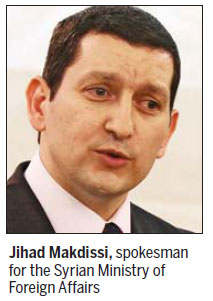Political dialogue key to solving crisis: Syria FM
Updated: 2012-02-03 08:08
By Li Lianxing (China Daily)
|
|||||||||||
|
|
DAMASCUS, Syria - Any UN resolution on the Syrian crisis should support ongoing political dialogue among the local people, a senior government official said, stressing that Damascus is doing what it can to facilitate the process.
Referring to the UN Security Council debates on Syria in New York, Jihad Makdissi, spokesman for the Syrian Ministry of Foreign Affairs, said the aim of any such move should be to help Syrians.
"Yes, we do have a crisis. But overcoming the crisis definitely (should) not (be done) by pressuring Syria and dictating Syria what to do," he told China Daily in an exclusive interview. "It (should be done) by engaging and encouraging the opposition to come and talk, because the way out is to have political dialogue and resolution."
Arab and Western powers on Tuesday urged the Security Council to pass a resolution that, backing an Arab League proposal, requires Syrian President Bashar al-Assad to hand powers to his deputy and defuse the 11-month-old uprisings.
China on Tuesday said it firmly opposes forcefully pushing for a regime change in Damascus because it would violate "the purpose and principles of the UN Charter and the basic norms governing international relations".
Meanwhile, in Damascus, Makdissi said the government had declared a reform agenda, is rewriting the Constitution and that a referendum would soon be published.
"We have achieved our local administration and we have a parliamentary election coming, and we also have a new law for peaceful demonstration, as well as a new law for political parties that has already been issued, which we want the opposition to engage in," he said.
He added that the country's ruling party will host a conference this month to elect new leadership.
Epicenter of the crisis
Echoing earlier views by Russia and China, the Syrian official said there is no reason to internationalize the events unfolding in his country. Damascus is cooperating with any initiative that will help Syria out of the crisis, he said.
Viable solutions to the current crisis should include more than just a resolution, and incorporate mechanisms that will allow Syrians to sit around the same table and "talk to each other without precondition", Makdissi said.
The official said the greatest obstacle facing Damascus is that forces of "external opposition" refuse to have meaningful dialogue.
"So what we want is to let the West encourage the government to welcome any reform initiative instead of saying this is not enough and it's too late," he said, adding: "This is what they do with other Gulf countries."
As government forces reclaimed the eastern suburb of its capital Damascus, the opposition is still active in other cities, including Homs and Hama, as well as in the provinces of Deraa and Idlib, where frequent clashes have been reported.
Even in the streets of Damascus, where the opposition has yet to gain ground, people find themselves increasingly taking sides.
Taxi driver Bader Baltargy, 34, is a vocal Assad supporter who calls the crisis "a conspiracy of Qatar, Saudi Arabia and the West".
"The government and our president are the only ones that can save the country, and we are ready to defend our nation," he said.
But other locals believe there must be an immediate reshuffling of the administration to end the crisis.
"The officials are so corrupt, and our business is getting more difficult in this country," said Abdul Bassam, owner of a construction company in Damascus. "It's time to have a new government."
Bassam Abu Abdullah, an international affairs professor at Damascus University, said the crisis is a political conspiracy, but one that emerged in the wake of deep-seated political and economic woes.
Assad, the first leader in Syrian history to raise the issue of political reform, has been bound by an aging political mechanism that is too old to do the job, he said.
At the same time, however, the professor said the deepening crisis in Syria is rapidly evolving into a "proxy war" against Damascus, particularly considering Syria's geopolitical position in the Middle East.
"There are 23 million Syrians, but why do they only support the opposition who are holding foreign passports and have nothing to do with the country?"
China Daily
Today's Top News
President Xi confident in recovery from quake
H7N9 update: 104 cases, 21 deaths
Telecom workers restore links
Coal mine blast kills 18 in Jilin
Intl scholarship puts China on the map
More bird flu patients discharged
Gold loses sheen, but still a safe bet
US 'turns blind eye to human rights'
Hot Topics
Lunar probe , China growth forecasts, Emission rules get tougher, China seen through 'colored lens', International board,
Editor's Picks

|

|

|

|

|

|






